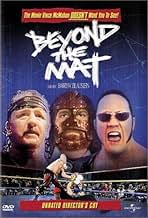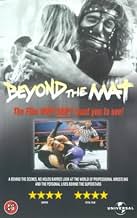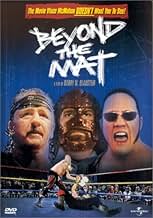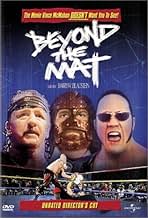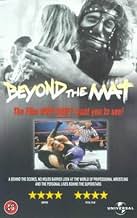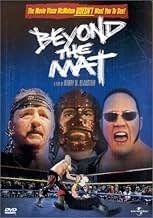NOTE IMDb
7,6/10
9,7 k
MA NOTE
Ajouter une intrigue dans votre langueA heartfelt documentary focusing on the day-to-day lives of professional wrestlers, some on the rise, some on the wane, and others fighting for their lives.A heartfelt documentary focusing on the day-to-day lives of professional wrestlers, some on the rise, some on the wane, and others fighting for their lives.A heartfelt documentary focusing on the day-to-day lives of professional wrestlers, some on the rise, some on the wane, and others fighting for their lives.
- Réalisation
- Scénario
- Casting principal
- Récompenses
- 3 victoires et 2 nominations au total
James Ware
- Self
- (as Coco B. Ware)
Avis à la une
As a wrestling fan, when I saw this movie in the video store, I had to get it. Thinking I'd be seeing nothing more than an overview of pro wrestling, I was pleasantly surprised to see this documentary by filmmaker Blaustein that incorporates all the major wrestling organizations in the U.S. and also some of the greatest wrestlers ever to step in the ring...including a few personal favorites like Mick Foley and Terry Funk. In showing these wrestlers as humans, Blaustein has created a view of wrestling unique in a world of trickery and promotional stunts. This is one helluva documentary going behind the scenes of all the wrestling promotions, showing the real people involved, and in the end shows the viewer that, indeed, in wrestling nothing as it seems. A few of the highlights include a touching, and tragic, portrayal of mat legend Jake "The Snake" Roberts, behind the scenes of a WWF pay-per-view, and the story of hardcore legend Mick Foley. I would highly recommend this to anyone...it is an entertaining and revealing film that I think even non-wrestling fans would enjoy.
Yes, that's the title to the second Mick Foley book, but it also does a good job of summarizing this wonderful documentary. This movie shows wrestling for the dangerous and addictive sport it is and that people seem to forget because the endings are predetermined. If you can watch the scenes where Foley is repeatedly hit in the head in front of his wife with a chair and then try and talk about how fake the sport is. Look at the life of Jake Roberts and say that there isn't something inherently messed up. Though it depicts horrible acts of violence and drug use, but this movie is more shocking in the damage people in this sport do to themselves in pursuit of this "fake" sport with so little respect for themselves. A chilling and wonderful documentary.
This is the greatest insiders look in wrestling of all time. We look at not only those individuals as characters but also as people. Terry Funk, New Jack, Mick Foley and Jake Roberts are to name just a few in this film and even if you're not a fan of wrestling or you think that wrestling is fake then look at this film and see that it's more real than people think.
Vince McMahon doesn't want you to see it. See it and it will open your eyes.
Vince McMahon doesn't want you to see it. See it and it will open your eyes.
Love them or leave them - misfit politicians, wayward spouses, and yes, professional wrestlers. Perhaps no other spectacle involves personalities as much as professional wrestling and Barry Blaustein's insightful "Beyond the Mat' explores those who thrill us with their lust for mayhem. Men and women with self destructive appetites are drawn into this entertainment venue - those who make a profit like the billionaire promoter Vince McMahon are called smart and shrewd, those who are swallowed up by their maladaptive behavior like the pathetic Jake'the Snake' Roberts are simply called mad. "Beyond the Mat" doesn't uncover anything we don't already know - the loud-mouth, hyped interviews, the staged choreography of flying bodies and colliding men against steel, and the spurting blood sacrificed in the name of violence. What we do see are the showmen who strut their stuff inside the ring, more dedicated to their brotherhood and craft than you can imagine. The battle wearied Terry Funk is a throwback to the self-managed, up-close-and-personal hero that Blaustein and a good number of his generation grew up with. The much younger Mick 'Mankind' Foley is a creation of the media driven World Wrestling Federation, a syndication leap years away from the Amarillo, Texas of Terry Funk. The deeply hurting Jake the Snake has fought so many battles in his long and troubled life that his only solace is crack cocaine and fighting in the ring. But the blood that Funk and Mick and Jake spill is the same blood of wanton brutality. It is the spectacle of harm and harming others. And yet in a cruel and twisted way, "Beyond the Mat" reminds us that wrestlers are as normal as anyone, just different. 'Mankind' and 'The Rock' can talk pleasantries before a match, before each tries to pulverize the other in front of their stunned wives and children. Terry Funk, as a gesture of forgiveness, repeatedly begs an old nemesis to referee his supposedly final match - a match in which he knows he will lose and will get brains bashed in. "Beyond the Mat' is a well made chronicle of wrestlers who care less if they win or lose (the promoters see to that) but more on how they play the game.
You've got to wonder about wrestlers. They're always on the road, they're always carrying knocks and injuries, they don't get paid much (except the few at the absolute top), they get no respect from the public at large, they don't actually compete in the legitimate sense of the word and the vast majority of them are quickly forgotten. Yet nearly all of the wrestlers in Beyond the Mat continue to seek the spotlight. Why? I guess Terry Funk sums it up best: "It's fun."
However, it's a strange type of fun. After all, I'm not sure that most people would class being hit over the head with steel chairs as 'fun'. Nor would most people relish the thought of being thrown off a steel cage. But as the film points out, wrestlers are hardly normal. At the same time, though, they're still people. They have the same problems as all of us. It's just that they earn their living by running around in spandex and by beating the crap out of one another.
Of all the different strands in Beyond the Mat, I like the Terry Funk section the most. It just shows how bizarre wrestling is. Here you have a man in his fifties who has degenerative arthritis and who wakes up in the morning, like many old men, in his y-fronts. Yet in the ring he's a bloodthirsty maniac. But at the same time he's a loving father who cries at his daughter's wedding and he has an excellent rapport with the man who he has his most brutal matches with. As dim-witted as wrestling is, nothing out of the ring is simple.
And the Funk section illustrates the problem that most wrestler face: they can't give up the spotlight. I mean, just take one of Funk's friends, Dennis Stamp. He hasn't wrestled in years but he still trains (by jumping up and down on a trampoline in his underwear) in the vain hope of getting another match. And when he's finally made the referee in Funk's 'retirement' match, he's beside himself with excitement at the prospect of being part of the main event. It seems like when you don't get paid much, when you're forced to do lousy jobs and when no one really knows who you are, the only compensation for such a depressing existence is a few cheers.
But although the film touches upon the dark side of wrestling, it's quite touching seeing Funk trying to persuade his friend Stamp to be part of his match. The man may be vicious in the ring, but outside it he's warm-hearted. And I like the way that when he persuades his friend to be part of his match, and when he walks away, he nearly trips over. Despite everything, he's just a lovable old guy. However, I also like the scene because Stamp is such a fool. He's so desperate to be someone and so desperate to be recognised, that he cuts a promo when he's explaining why he can't make the event ("I'm not booked!). It's as if reality and wrestling are blurred. He can't tell them apart.
Another wrestler who's been messed up by the business is Jake Roberts. He doesn't get on with his daughter and he's forced to pay for his drug habit by wrestling in fourth-rate events in backwater towns. He's even filmed urinating into a bucket and then falling asleep backstage. It really does give a depressing picture of what it is to be a professional wrestler your existence revolves around the road, run down hotels and small towns. No wonder so many of them are screwed up. But Roberts has even more reason to be screwed up than most. He's the product of a rape and his sister was kidnapped and murdered. And he has a terrible relationship with his father. They can barely look at one another. There's no connection there at all. And it's quite shocking hearing Roberts describe how he gave up his dreams just to shove wrestling down his father's throat (his dad was a wrestler and Robert's resolved to be better than him). Suddenly you can see why Robert's created such a compelling character. He was just drawing on his own life. Again reality and wrestling is blurred.
Perhaps the only one in the film that has a decent handle on things is Mick Foley. He has a clear plan (he wants to retire by the age of 35) and he has a solid family to support him. Somehow you know that he's going to be fine. Not that there aren't a few bumps on the way. In one scene he's forced to watch footage of his wife and kids screaming when he's repeatedly hit over the head with a steel chair. It's a real wake-up call. I mean, as entertaining as it is for sadistic bastards like myself, you just can't make you family endure that time after time. But it's his family that will keep Foley on the straight and narrow. However, for the other wrestlers who don't have stable personal lives, they'll have to seek love in cheers and applause. It seems like wrestling is a drug that most wrestlers can't crack.
Not that a few don't try. There's an amusing scene when a wrestler called New Jack, who has four justifiable homicides, auditions for a Hollywood casting agent. The people there are slimy beyond belief. They make the carnies in wrestling look honest in comparison.
But why the film succeeds so emphatically is because everything is just presented as it is. No judgements are made and nobody is looked down upon. Yeah, wrestling may be something on the fringes of society, but the film shows that as weird as it is, the people aren't really that weird after all. They're just people with the same problems we all have.
However, it's a strange type of fun. After all, I'm not sure that most people would class being hit over the head with steel chairs as 'fun'. Nor would most people relish the thought of being thrown off a steel cage. But as the film points out, wrestlers are hardly normal. At the same time, though, they're still people. They have the same problems as all of us. It's just that they earn their living by running around in spandex and by beating the crap out of one another.
Of all the different strands in Beyond the Mat, I like the Terry Funk section the most. It just shows how bizarre wrestling is. Here you have a man in his fifties who has degenerative arthritis and who wakes up in the morning, like many old men, in his y-fronts. Yet in the ring he's a bloodthirsty maniac. But at the same time he's a loving father who cries at his daughter's wedding and he has an excellent rapport with the man who he has his most brutal matches with. As dim-witted as wrestling is, nothing out of the ring is simple.
And the Funk section illustrates the problem that most wrestler face: they can't give up the spotlight. I mean, just take one of Funk's friends, Dennis Stamp. He hasn't wrestled in years but he still trains (by jumping up and down on a trampoline in his underwear) in the vain hope of getting another match. And when he's finally made the referee in Funk's 'retirement' match, he's beside himself with excitement at the prospect of being part of the main event. It seems like when you don't get paid much, when you're forced to do lousy jobs and when no one really knows who you are, the only compensation for such a depressing existence is a few cheers.
But although the film touches upon the dark side of wrestling, it's quite touching seeing Funk trying to persuade his friend Stamp to be part of his match. The man may be vicious in the ring, but outside it he's warm-hearted. And I like the way that when he persuades his friend to be part of his match, and when he walks away, he nearly trips over. Despite everything, he's just a lovable old guy. However, I also like the scene because Stamp is such a fool. He's so desperate to be someone and so desperate to be recognised, that he cuts a promo when he's explaining why he can't make the event ("I'm not booked!). It's as if reality and wrestling are blurred. He can't tell them apart.
Another wrestler who's been messed up by the business is Jake Roberts. He doesn't get on with his daughter and he's forced to pay for his drug habit by wrestling in fourth-rate events in backwater towns. He's even filmed urinating into a bucket and then falling asleep backstage. It really does give a depressing picture of what it is to be a professional wrestler your existence revolves around the road, run down hotels and small towns. No wonder so many of them are screwed up. But Roberts has even more reason to be screwed up than most. He's the product of a rape and his sister was kidnapped and murdered. And he has a terrible relationship with his father. They can barely look at one another. There's no connection there at all. And it's quite shocking hearing Roberts describe how he gave up his dreams just to shove wrestling down his father's throat (his dad was a wrestler and Robert's resolved to be better than him). Suddenly you can see why Robert's created such a compelling character. He was just drawing on his own life. Again reality and wrestling is blurred.
Perhaps the only one in the film that has a decent handle on things is Mick Foley. He has a clear plan (he wants to retire by the age of 35) and he has a solid family to support him. Somehow you know that he's going to be fine. Not that there aren't a few bumps on the way. In one scene he's forced to watch footage of his wife and kids screaming when he's repeatedly hit over the head with a steel chair. It's a real wake-up call. I mean, as entertaining as it is for sadistic bastards like myself, you just can't make you family endure that time after time. But it's his family that will keep Foley on the straight and narrow. However, for the other wrestlers who don't have stable personal lives, they'll have to seek love in cheers and applause. It seems like wrestling is a drug that most wrestlers can't crack.
Not that a few don't try. There's an amusing scene when a wrestler called New Jack, who has four justifiable homicides, auditions for a Hollywood casting agent. The people there are slimy beyond belief. They make the carnies in wrestling look honest in comparison.
But why the film succeeds so emphatically is because everything is just presented as it is. No judgements are made and nobody is looked down upon. Yeah, wrestling may be something on the fringes of society, but the film shows that as weird as it is, the people aren't really that weird after all. They're just people with the same problems we all have.
Le saviez-vous
- AnecdotesWrestling legend Roddy Piper described this film as "The best documentary ever made on professional wrestling."
- Citations
Jake Roberts: My mother was 13 years old when I was born. Why? Because my dad raped a little girl that was in a room asleep. My dad was going out with my mother's mother. There you go. There's some bones for Jake the Snake.
- Crédits fousClosing dedication: This film is dedicated to my wife, Lorrie and our children, Kasey and Corey, who have stood by patiently with love and support as I blabbed about wrestling for the last five years.
- Versions alternativesThe DVD edition of Beyond the Mat has several minutes of deleted footage, plus audio commentaries by Mick Foley & Terry Funk
- ConnexionsFeatured in WatchMojo: Top 10 Controversial Documentary Movies (2015)
Meilleurs choix
Connectez-vous pour évaluer et suivre la liste de favoris afin de recevoir des recommandations personnalisées
Détails
- Date de sortie
- Pays d’origine
- Site officiel
- Langue
- Aussi connu sous le nom de
- Beyond the Mat
- Lieux de tournage
- Sociétés de production
- Voir plus de crédits d'entreprise sur IMDbPro
Box-office
- Budget
- 500 000 $US (estimé)
- Montant brut aux États-Unis et au Canada
- 2 053 648 $US
- Week-end de sortie aux États-Unis et au Canada
- 9 532 $US
- 24 oct. 1999
- Montant brut mondial
- 2 053 648 $US
- Durée1 heure 42 minutes
- Couleur
- Mixage
- Rapport de forme
- 1.85 : 1
Contribuer à cette page
Suggérer une modification ou ajouter du contenu manquant

Lacune principale
By what name was Au-delà du ring (1999) officially released in India in English?
Répondre

